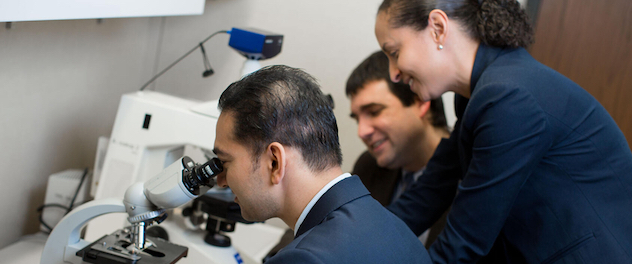 Collaborations yield results
Collaborations yield results
The Division of Rheumatology at Mayo Clinic is committed to finding new ways to care for patients and advance understanding of rheumatic diseases such as vasculitis, systemic autoimmune diseases and inflammatory arthritis.
Overview
The Division of Rheumatology, part of Mayo Clinic's Department of Medicine, is internationally recognized for its patient-centered approach and contributions to rheumatic disease understanding and treatment. Faculty members in the division have expertise in several areas and specialize in one of three main categories:
- Vasculitis — giant cell arteritis, anti-neutrophil cytoplasmic autoantibody (ANCA)-associated vasculitis and all other forms of vasculitis.
- Systemic autoimmune diseases — systemic lupus erythematosus, scleroderma, myositis and related disorders.
- Inflammatory arthritis — rheumatoid arthritis, ankylosing spondylitis, gout and other types of inflammatory joint diseases.
Clinical investigators and basic scientists in the Division of Rheumatology have a long history of collaboration. In 1950, Philip S. Hench, M.D., a rheumatologist, and Edward C. Kendall, Ph.D., a biochemist, received the Nobel Prize for their discovery of cortisone and its clinical applications. This began the long-standing partnership between clinical and basic science researchers. Faculty members in the division continue to collaborate to address the complex needs of patients with rheumatic diseases.
The basic science laboratories use animal models and human biospecimen samples to further investigate how common rheumatic diseases develop. The laboratories have a series of methods and equipment to conduct various tests:
- Seahorse analyzer and mass spectrometers are used to measure metabolic activity.
- Immune cells and protein expression are profiled with flow cytometry.
- Antibody levels are measured with polymerase chain reaction (PCR) assays and sequencing using enzyme-linked immunosorbent assay (ELISA).
- Other methodologies used in the laboratories include electron microscopy, single cell analysis and humanized mouse technology.
- Animal models are used to model rheumatic diseases in humans and to perform preclinical tests of potential therapeutics.
Clinical research is conducted in the division's outpatient practice. The main goal of this research is to create individualized treatments for patients with rheumatic diseases. Two main types of research are conducted in the clinical setting. The first type is ongoing clinical trials that include testing novel treatments and interventions. The second category of studies focuses on patient-reported outcomes and longitudinal data collection.
Rheumatology faculty are invested in the educational growth of the next generation of researchers and clinical partners. Investigators in the division provide mentorship to junior faculty and postdoctoral trainees and fellows in both basic science research and clinical research.